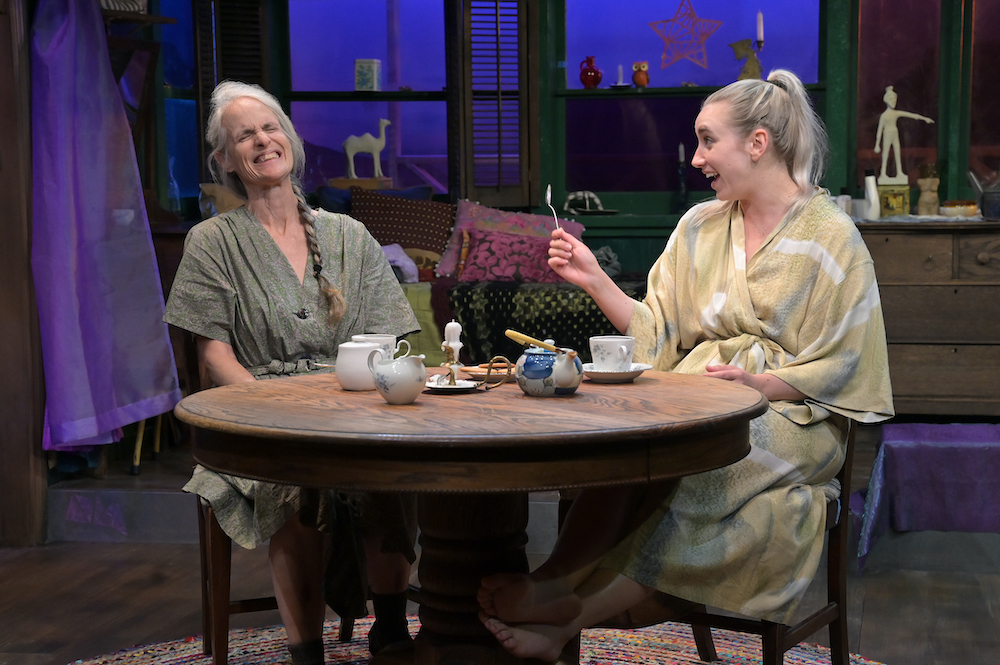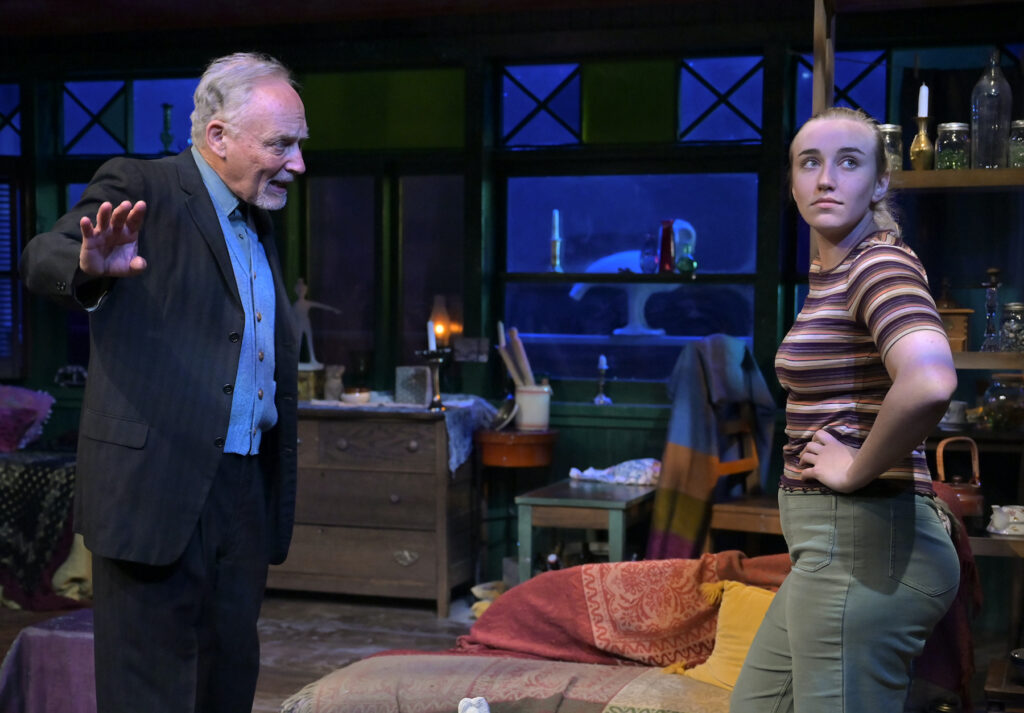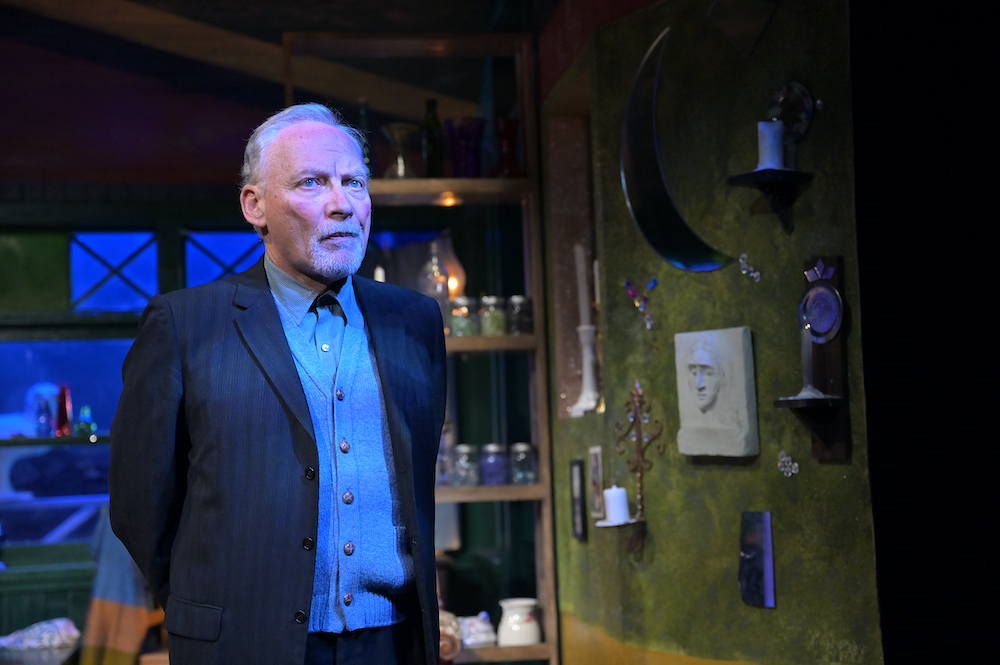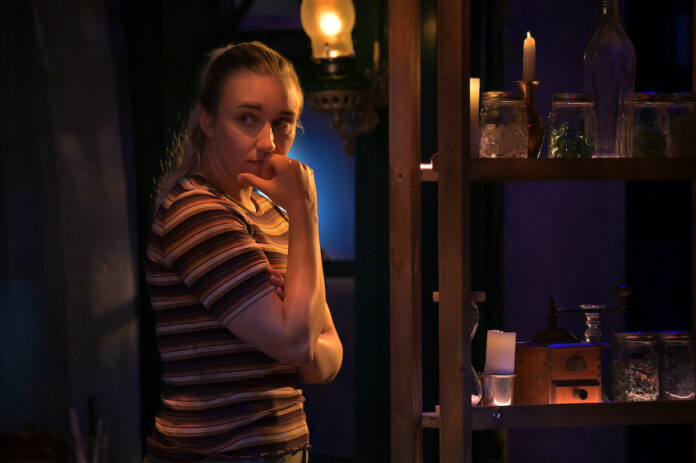The Road to Mecca (through June 30 at Z Below, SF) is one of those shows a critic hates trying to explain because doing so is a no-win prospect. On the one hand, this is a show anchored by two strong performances by women—one in her 20s, one in her 70s—and that tells a story rejecting institutional sexism. On the other hand, one of the aforementioned women has an obsession—with which we’re meant to empathize—that reeks of Orientalism. The story demands a great amount of empathy for apartheid-era South Africans just because their racist worldview is becoming more and more obsolete.
It’s 1974 and Elsa (Kodi Jackman), a progressive teacher at an all-Black school in Cape Town, has just made the long trek back to her home village. She’s answering an urgent letter sent to her by septuagenarian Helen (Wendy vanden Heuvel), the local eccentric known for her large garden statues and home décor inspired by the play’s titular Islamic holy city. It goes without saying that these peculiarities don’t sit too well with her fellow conservative Afrikaners, particularly her longtime pastor Marius (Victor Talmadge).
But it’s no longer just whispering neighbors and kids hurling rocks at Helen’s house. Now, Marius is saying Helen is mentally unstable and should have her home taken from her. Given that the isolated widow isn’t one for confrontation, it’s easy to see why she sends for the stronger-willed Elsa, who grew up finding solace in the four walls of Helen’s house. Except that isn’t why Elsa’s here. She’s come to follow up on a particular incident, one that actually does beg the question as to whether Helen is in a healthy mental state.

Before I go on, I have to give a special shout-out to the production’s tech crew. Set designer Erik Flatmo (with charge artist Adeline Smith, sculptor Mary Frank, constructors David Gardner and R Productions, and prop master Leah Hammond) put so much intricate detail into Helen’s tchotchke-filled home that one finds themself carefully scrutinizing all the details in order to determine what’s real and what isn’t—the upstage windows and their mountain vistas were particularly striking in their realism.
Similarly, lighting designer Kurt Landisman once again does work of such subtlety and distinction, as when an occasional peek out the aforementioned windows reveals an ever-so-slight change from daylight to dusk over the course of the first act. These technical artists have gone out of their way to make the set as “plain” and “lived-in” as possible that it would be easy to dismiss how much work they put into giving Helen’s house a personality all its own. It’s only June, but this is already one of 2023’s best examples of theatre tech.
Praise should also go to director Timothy Near and her cast. One sign of a great director is that when more than one actor is on stage, the audience knows precisely how the power balance of the room works without it having to be announced. Near’s cast bring a great amount of nuance to their performances (I particularly recall Elsa seething in the background early in Act 2, as Marius bloviates endlessly to Helen.) Jackman and vanden Heuvel are particularly effective in personifying the dichotomy of country for which those atop the status quo (unknowingly) have only two decades of rule left.

Talmadge is just as effective, but the presence of Marius asks certain members of the audience to make a compromise with which they may feel uncomfortable. Marius is Afrikaner in mind as much as body, quick to dismiss Helen’s talk of liberating South African Black people because Marius “hasn’t heard any complaints” from them before. Playwright Athol Fugard wisely makes Marius the super ego to Helen’s id, with proper ego Helen stuck between their two worlds.
The problem is that Fugard goes beyond making Marius simply a character with whom one can empathize—he is human, after all—to begging us to feel sorry for him as the play goes on. Finding his humanity (which Talmadge does excellently) is one thing, but Fugard insist that we also feel sorry for this colonizer, a conformist and an old-school misogynist, simply because he’s an obsolete piece of hardware. The final minutes of the play rightfully side with Helen, but they also insist we feel sorry for the man wanting to stifle her.
I found myself reminded of Tom Stoddart’s famous South African photos featuring a crying AWB boy after he’s just heard apartheid is ending. Apartheid wasn’t some innocuous difference of opinion, and expecting us to share in the tears of these felled fascists reflects a tone-deafness of which Fugard clearly isn’t aware, no matter how progressive he writes Elsa and Helen.
Then there’s the problem of Helen’s makeshift Mecca. We can applaud her safe space and the way it reflects her rejection of the status quo, but Helen has never been to the Middle East and outright fetishizes it as something “exotic.” Perhaps it wouldn’t have been era-appropriate for the story to call it out, but that doesn’t make it any less cringe-y to watch.
Although the entire Z Space complex has loosened its once-strong COVID protocols, I was happy to see that the producers of this show—which was presented on the Z Below stage—still required that audiences be masked when not actively drinking (which I only saw happening in the lobby). For an old building, the air flow of this subterranean black box seemed fairly decent, with my Aranet4’s CO² readings peaking at about 1432ppm over the course of the two-hour-plus show.

The Road to Mecca is a wonderfully intimate story about the necessity of community and the power—not weakness—that comes from reaching out for help when you need it. It’s a fine tale of striking back against the patriarchy, no matter your age or station. Nevertheless, the story still is weighed down by its own white privilege, demanding that its personification of that white patriarchy be told, “Oh, you poor boy” because things don’t go his way. This fictional beneficiary of apartheid is no more deserving of pity than a real-life beneficiary of apartheid (one who continues to promote the fascist ideas with which he grew up.)
It’s a fine production with strong performances, good direction, and excellent production value. But its Orientalism and sympathy for white tears find its script contradicting its own message.
THE ROAD TO MECCA runs through June 30 at Z Below, SF. Tickets and more info here.




